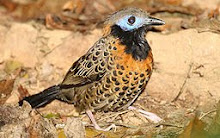"Iconic," you read, when you bone up on the Galapagos.
"Amazing."
"Stunningly beautiful in a stark, primitive way."
It's all true, of course. The Galapagos are all that and more, but what struck me like a zen stick alongside my head is how trusting, how positively confiding, the animals inhabitants are. They appear to have little or no fear of people. A Galapagos Mockingbird hopped right up to my foot on Genovesa Island as if I were some interesting new tree. It then proceeded to accompany my group of bemused, fellow-birders for fifty yards, hopping beside us or leading the way until finally losing interest.
On Santa Cruz Island, three-foot-long Marine Iguanas lay unmoving as we carefully walked around and between them, piled on the sand like a collapsed huddle of footballers. A male Galapagos Sea Lion challenged us to the extent of walking toward us on the shore until we parted to let him pass, whereupon, dominance established, he threw himself down in our midst and streched langorously. On Isabela Island, the endangered Mangrove Finch perched 18 inches from us when our guide, Peter Freire, played its song from an iPod. A Floreana Mockingbird from the Island of the same name landed on my friend, Martha's, head! Everywhere we have sailed in these enchanted islands, it has been the same. The animals are completely nonchalant at our approach, even when we are within a few feet of their nests. It is almost unnerving how relaxed they are with us.
Of course, Nature suspends her laws for no one. We saw a Short-eared Owl casually snag a Wedge-rumped Storm-Petrel right out of the air when it flew fatally close to the owl's perch on the lava. One nip of its bill on the back of the neck and the Storm-Petrel was dinner. We watched Magnificent Frigatebirds, those pirates of the air, swoop down repeatedly on Green Sea Turtle hatching in the sand in the late afternoon son. Virtually all sea turtles are endanged, but in the Galapagos, they are protected only from human beings and other introduced species, not from their natural preditors. I doubt that many hatchings from that nest survived to reach the ocean.
Darwin's Test Tube, this hot house of genetic drift, has not changed much since the Voyage of the Beagle in 1835. To survive here, animals must be able to out-compete or out-run their neighbors. We, the aliens, are not the enemy because, mercifully, we are not allowed to be, but that is not the same thing as being protected from the law of the survival of the fittest. Magnificent Frigatebirds, Short-eared Owls and Galapagos Hawks have to eat the same as Mangrove Finches and Green Sea Turtles. In the end, it's not about the survival of the individual, but the survival of the species. It's something we Homo spapiens would do well to remember.
Sunday 26 June 2011
Subscribe to:
Posts (Atom)
